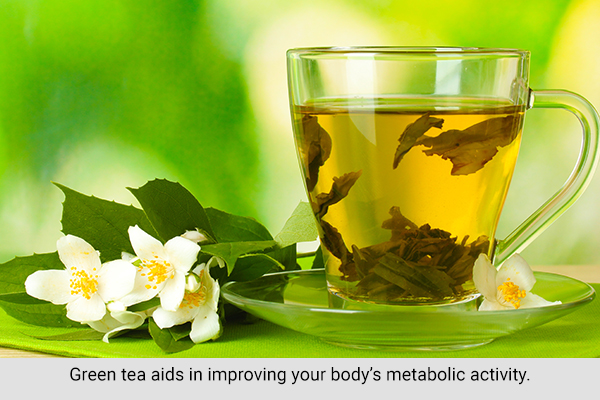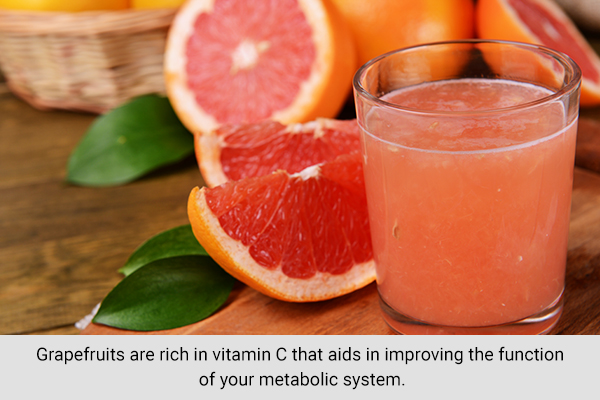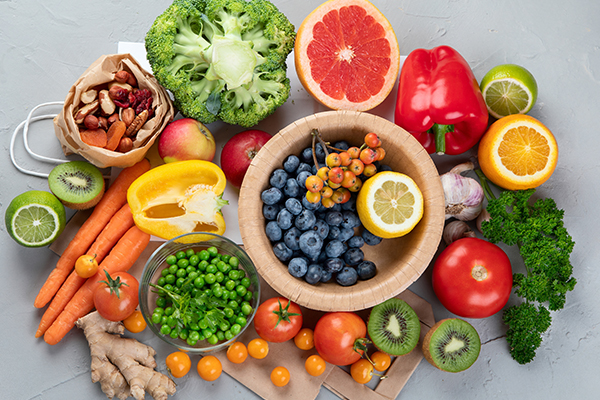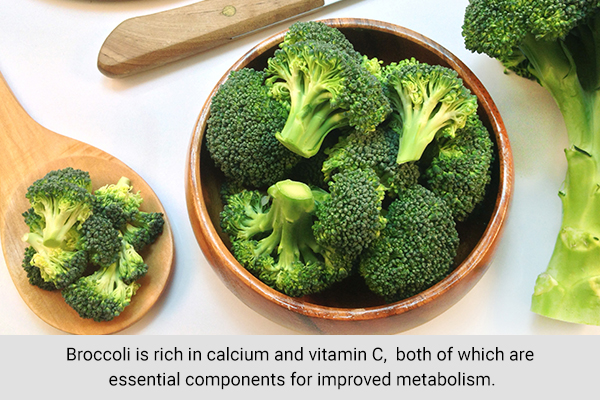In the most basic terms, metabolism is the process through which your body transforms the food you eat into energy.

This term describes all the continuous chemical processes that are going on in your body in order to keep you alive and to help your organs function normally, such as, breathing, repairing cells and digesting foods. (1)
When your body is resting, the basal metabolic rate (BMR) of your body helps maintain the basic functions like cell renewal and repair, blood circulation, breathing, and a hormonal balance. It is one of the ways in which your body utilizes calories as energy.
There are several things that influence your basal metabolic rates, like genes, physical activity, age, gender, muscle mass, and certain diseases such as hypothyroidism. (1)
How Can You Increase Your Metabolism Naturally
Here are some ways to increase your metabolism.
1. Eat a protein-rich diet
Diet plays an important role in increasing metabolism and ultimately supporting weight loss. (2) Value of energy expenditure is higher at high protein consumption.
Also, protein-induced thermogenesis plays an essential role in helping metabolism work at a faster rate, as the increased rate of thermogenesis sets into motion metabolism at the rate at which it can support the needs of the body for smooth functioning.
Protein-rich foods are also helpful in modulating metabolism and maintaining energy balance. (3) Some good food sources of protein are seafood, white meat poultry, eggs, beans, lentils, milk, cheese, and Greek yogurt.
2. Exercise regularly

Aerobic exercises like running and Zumba are one of the best options for burning calories. (4) The more intense they are, the more calories you will burn.
Burning more calories helps increase the metabolism of your body because it encourages the body to keep up with the current rate of energy expenditure. (5)
You can alternate between a higher and lower intensity aerobic exercise. For example, you can do jumping jacks for 1 minute and then walk in place for 2 minutes. You can repeat this for 15 minutes.
3. Drink plenty of water
Water may help you give your metabolism a boost. A study showed that the participants’ metabolism boosted after increased water intake. (6)
But the water itself can get very bland. So, an excellent way to make sure that you meet your water intake recommendations is by adding lemon to it.
Adding lemon to your water would also help in the detoxification of your liver and in cleansing the digestive system. The enzymes and vitamin C in lemons help in clearing toxins from the body, which can ultimately help improve your metabolic function and reduce weight.
Lemon is full of antioxidants and other health benefits, hence, it’s definitely worth including in your diet.
Try squeezing the juice of a ½ lemon in a glass of warm water and drink it daily in the morning on an empty stomach. You can make a jug of lemon water and keep it in the fridge to drink throughout the day.
4. Green tea is worth a try

When talking about metabolism boosters, green tea is always part of the conversation. Loaded with antioxidants and polyphenols, green tea aids in improving your body’s metabolic activity.
A 2012 study published in the Journal of Medicinal Food found that women who consumed green tea combined with resistance training showed significant increases in resting metabolic rate, lean body mass, and muscle strength, and significant decreases in body fat, triglycerides, and waist circumference as compared to control group. (7)
The effect of green tea was studied on lipid metabolism and weight gain, and it was found that green tea suppresses lipid metabolism, and thereby fat accumulation and increase in body weight. (8)
A study published in Chinese Medicine in 2010, discusses the various health benefits of green tea for humans, including different types of cancer, heart disease, and liver disease. (9)
5. Reap the benefits of cayenne pepper
Cayenne pepper contains a compound known as capsaicin that has a positive impact on your body’s metabolic rate. The thermogenic properties of capsaicin help the cells convert energy into heat. (10)
A study published in 2013 reports that consuming 2.56 mg capsaicin per meal supports negative energy balance and promotes fat oxidation, moreover it does not increase blood pressure significantly either. (11)
Capsaicin enhances the activity of proteins inside fat cells that help break down fat, according to a study published in the Journal of Proteome Research in 2010. Researchers found that subjects fed a high-fat diet with capsaicin experienced greater decreases in body fat compared to the non-capsaicin group. (12)
Try sprinkling cayenne pepper on any of your proteins for a kick and metabolic boost!
6. Include grapefruit in your diet

Grapefruits are rich in vitamin C which aids in improving the function of your metabolic system. Vitamin C may help regulate fat metabolism and is being looked at for its potential in obesity treatment. (13)
Grapefruits also contain naringenin, a flavonoid that has excellent antioxidant properties. Naringenin helps lower insulin levels in the blood. This, in turn, leads to balanced blood sugar levels and improved metabolism aiding weight loss.
Researches have shown that obese people who included grapefruit, grapefruit juice, and grapefruit capsules in their diet, experienced significant weight loss at different levels. Insulin resistance was improved with fresh grapefruit. However, grapefruit alone cannot help in weight loss, but it definitely aids the process.
Aim to eat fresh grapefruit, as the juice itself tends to contain way more sugar per serving.
Note: As grapefruit juice and whole grapefruits can interact with certain prescription and non-prescription drugs, it is recommended to consult a doctor before including this fruit in your diet.
7. Drink coffee
Coffee is a well-known metabolism booster. One reason is that caffeine is a psychoactive central nervous system stimulant that works to improve your body’s metabolic rate, among other effects. Coffee consumption seems to be favorably related with health by metabolic impairment. (14)
Single-dose oral administration of 100 mg caffeine increased the resting metabolic rate of both lean and post-obese human volunteers by 3–4%. (15)
Caffeine specifically releases epinephrine, better known as adrenaline. Adrenaline will release fatty acids from tissue, in anticipation of fatty acids being utilized for energy. Coffee also contains chlorogenic acid, which may help slow the absorption of carbs.
According to a study published in the American Journal of Clinical Nutrition, researchers showed that caffeine ingestion increased energy expenditure (≈13%) and doubled the turnover of lipids and oxidation. (16)
A study in the same journal observed that coffee may increase thermogenesis, in part by increasing fat oxidation. (17)
In a review published in the Journal of Sports Science and Medicine, researchers examined six such studies and found that caffeine supplementation increases the body’s energy expenditure over a period of 24 hours. (18)
Is it any wonder health food stores are saturated with caffeine pills for anything from weight loss to exercise enhancement? But stick to just the cup of Joe instead of the pills.
Also, keep in mind that too much caffeine can be counterproductive, so keep to the recommended amount of 1 to 3 (6-ounce) cups a day.
8. Eat fiber-rich foods

Studies show that dietary fiber is inversely related to obesity. (19) Eating fiber-rich foods like apples, bananas, whole wheat, etc., would help keep the excess weight gain in check and boost your metabolism as well.
Low in calories and rich in soluble fiber, apples would be an excellent choice. Its fiber content also aids in digestion and feeds friendly bacteria in your gut, which can influence your metabolism.
While an apple a day is healthy in many ways, it can also help you lose weight. Plus, it helps you feel satiated for longer, preventing hunger pangs that lead to impulsive eating choices.
It is argued that increasing levels of dietary fiber by eating a whole apple before a meal can be an effective strategy for increasing satiety and decreasing energy intake at a meal.
Additionally, the several B vitamins, as well as vitamin K, potassium, magnesium, and manganese in apples, work together to turn fats, carbohydrates and protein that you consume throughout the day into energy.
Green apples seem to have a slight advantage over red in some weight loss studies, but any apple is great for you.
9. Add ginger to your diet
Another common kitchen ingredient that can give a boost to your metabolism is ginger. It has been shown in studies to have a thermogenic effect. The thermogenic effect of food means the caloric cost of digesting and processing the food eaten. The higher the thermogenic effect, the higher the metabolic rate after food consumption.
Being a vasodilator, ginger helps increase the diameter of small arteries and improve blood circulation. Increased blood flow and circulation is known to cause an increase in body temperature, which in turn promotes metabolism and helps your body burn more calories.
A 2012 study published in Metabolism shows enhanced thermogenesis and satiety in the group consuming ginger vs. placebo thus suggesting a potential role of ginger in weight management. (20)
10. Consume broccoli

Broccoli is one of those foods that help improve metabolic activity in your body. It is rich in calcium and vitamin C, both of the essential components for improved metabolism. Calcium acts as a trigger for boosting metabolism, while vitamin C aids in better absorption of calcium. (21)
Further, broccoli is packed with phytochemicals that accelerate the breakdown of fat in the cells, thus, ridding the body of excess deposits. Rich in folate, dietary fiber, omega-3 fatty acids, magnesium, and vitamins C, K, B6 and B12, broccoli helps burn fat without adding extra calories.
Adding 1 to 1½ cups of raw or cooked broccoli to your diet daily is effective for improving metabolism and promoting weight loss.
Final Word
A slow metabolism is usually indicated by symptoms like easy weight gain, fatigue, depression, and decreased libido. (1)
While it is true that metabolism is partly ruled by genetics, there are many ways to rev it up naturally. One way to do this is by eating foods that are known to naturally help boost metabolism.
- Was this article helpful?
- YES, THANKS!NOT REALLY



